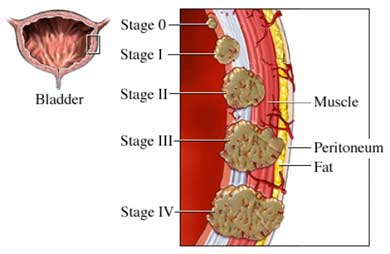
Diagnosed with Cancer? Your two greatest challenges are understanding cancer and understanding possible side effects from chemo and radiation. Knowledge is Power!
Learn about conventional, complementary, and integrative therapies.
Dealing with treatment side effects? Learn about evidence-based therapies to alleviate your symptoms.
Click the orange button to the right to learn more.
Bladder Cancer Stage II- Chemo? Cystectomy?

- Cancer Survivor
- Cancer Coach
- Directior PeopleBeatingCancer
Bladder Cancer: Types of Treatment
“ON THIS PAGE: You will learn the basics about the different types of treatments doctors use for people with bladder cancer. Use the menu to see other pages.
This section explains the types of treatments, also known as therapies, that are the standard of care for cancer. “Standard of care” means the best treatments known so far. When making treatment plan decisions, you are encouraged to discuss with your doctor whether clinical trials are an option. A clinical trial is a research study that tests a new or modified approach to treatment. Doctors learn through clinical trials whether a new treatment is safe, effective, and possibly better than the standard treatment. Clinical trials can test a new drug, a new combination of standard treatments, or new doses of standard drugs or other treatments. Clinical trials are an option for all stages of cancer. Your doctor can help you consider all your treatment options, including clinical trials…”
Bladder Cancer- A life Changing Success
“In late November 2014 I had lost 35 pounds after retiring earlier that year. I had been taking a blood pressure pill with a diuretic and because of the weight loss I thought the diuretic was too strong making me go to the bathroom all morning after three cups of coffee. I saw my doctor that week and took a urine test to see if anything else may be contributing to the problem.
The test showed minute traces of blood even though visibly my urine was clear. I was referred to my urologist and saw Dr. Eric Klein of the Cleveland Clinic the next week. Dr. Klein is the Chairman of Urology at the Clinic Glickman Tower main campus.
Dr. Klein did a scope of my prostrate and my bladder and found multiple tumors in my bladder. That was on 12/19/2015. I was surprised because I am a non- smoker and do not drink alcohol.
Dr Klein scheduled a TURBT procedure on 12/23/15 at the Beachwood Clinic to remove the tumors and check pathology. The procedure took an hour and was Outpatient. Dr. Klein’s initial prognosis after seeing the tumors is that they were cancer and there was a strong probability I would have to have my bladder removed…”
Radical cystectomy: a review of techniques, developments and controversies
“Conclusions-
RC plays a central role in the multimodal therapy of patients with high risk NMIBC and MIBC. The negative impact on quality of life and the high rate of peri-operative complications pose important limitations, especially in the context of a disease that affects primarily elderly patients with multiple medical co-morbidities.
RC must therefore be viewed as one element of a complex, multidisciplinary treatment plan.
Measures to improve outcomes include:
- regionalization of care to high volume centers,
- the use of ERAS protocols,
- and technologic advances such as robotic surgery,
although this last element has yet to have a major impact on outcomes. Patient selection and the tailoring of the urinary diversion to the patient’s needs are paramount. Level I evidence to direct the use of the extended PLND is eagerly awaited in the near future, and neoadjuvant therapies are likely to evolve with advances in systemic therapy. These are all meaningful strides in the effort to improve patient outcomes…”


